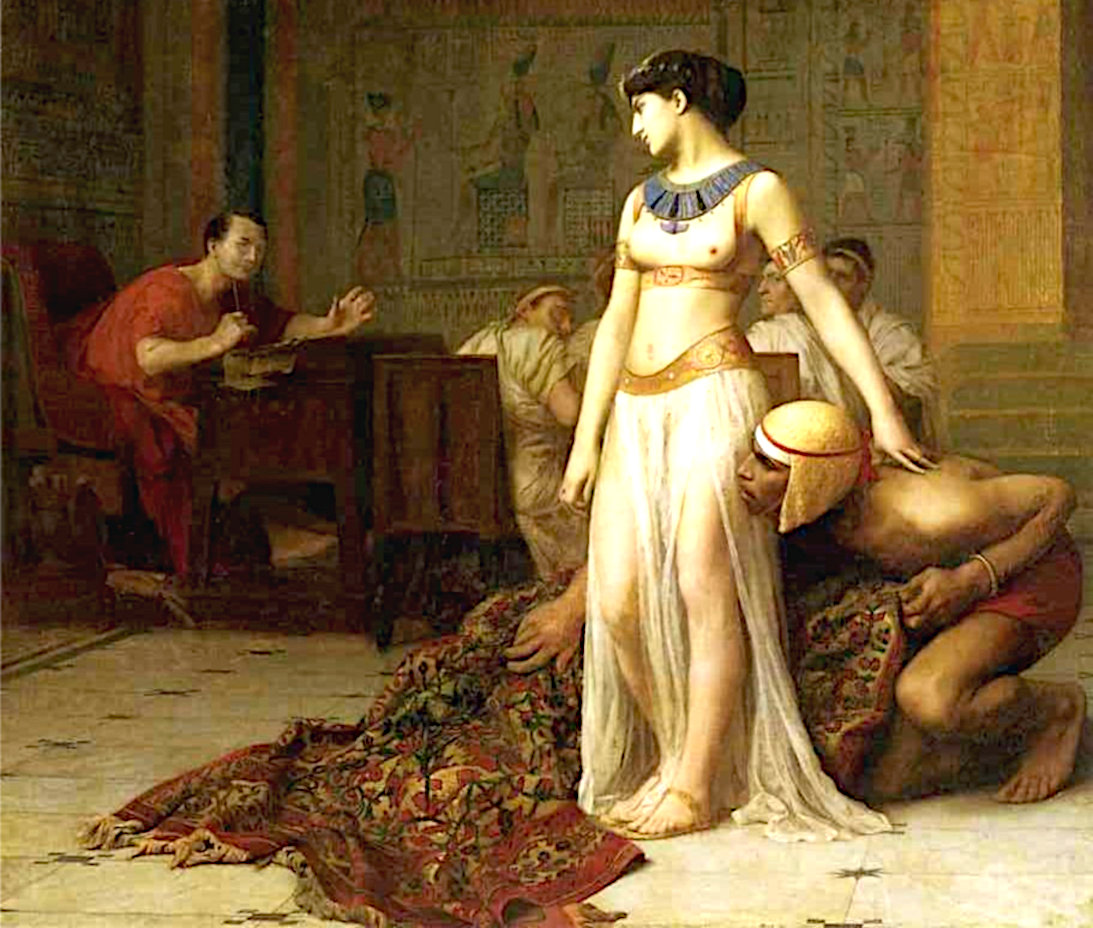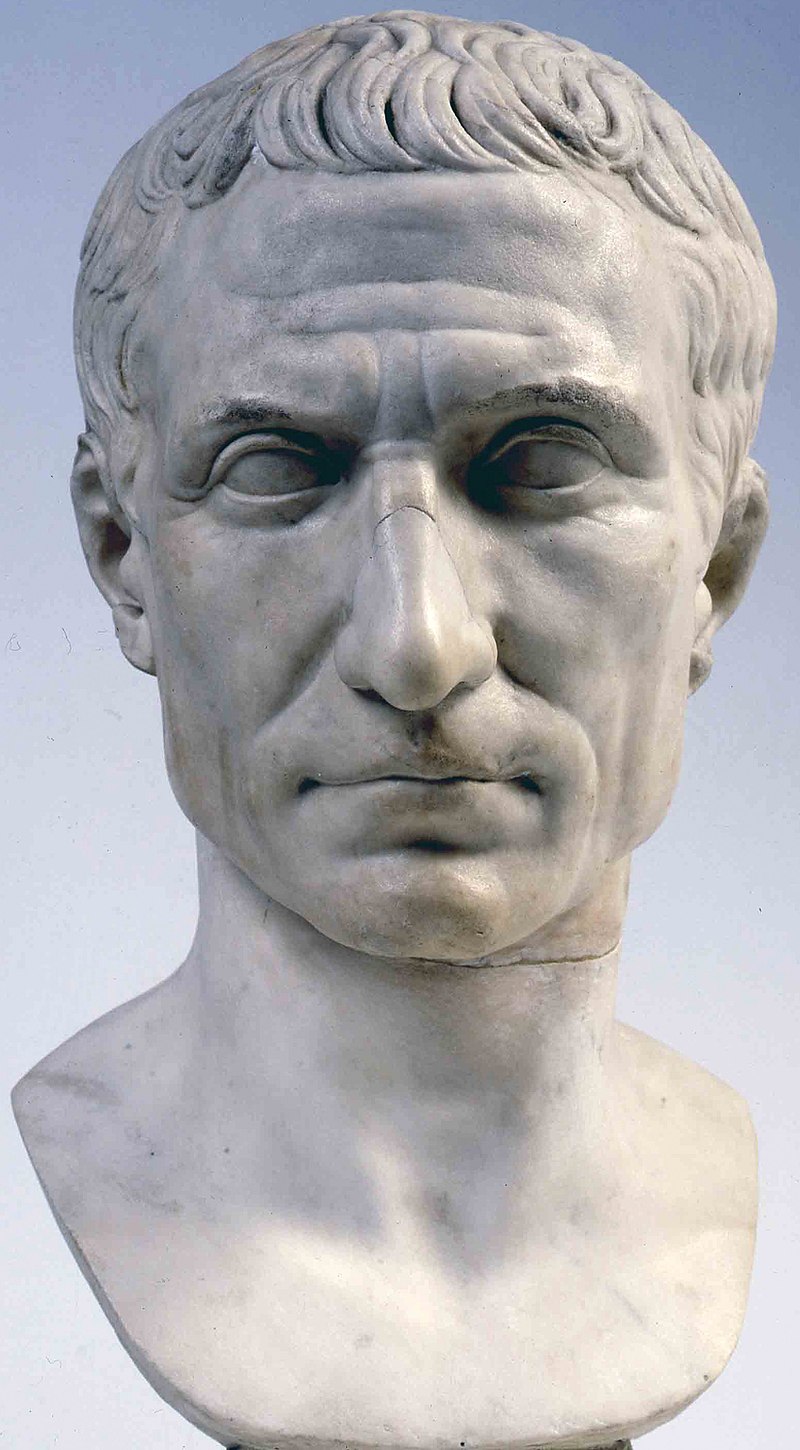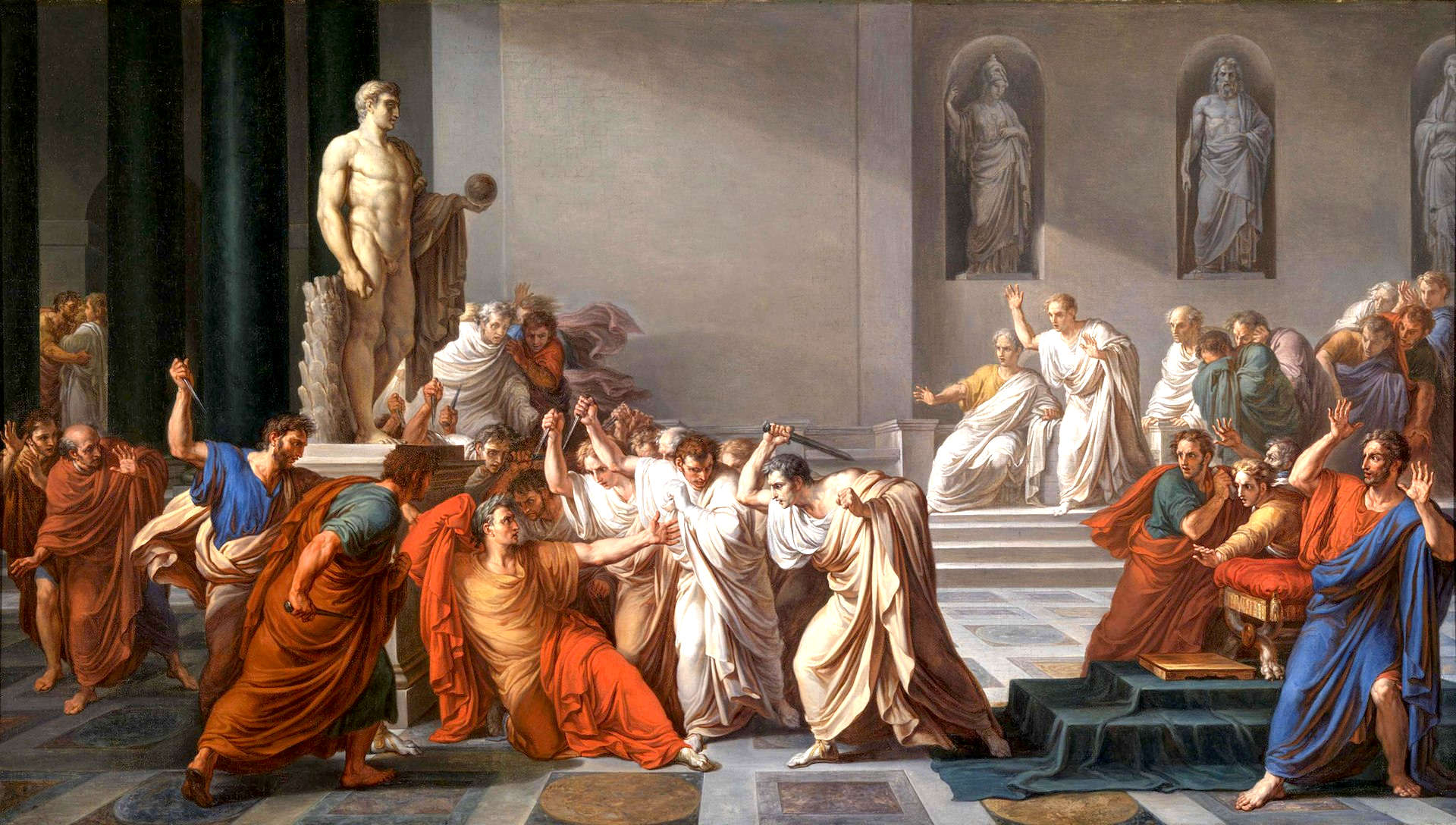
Cleopatra
sets out to seduce the Roman Emperor
Gaius Julius Caesar (12 July 100 BC – 15 March 44 BC) was a Roman general and statesman. A member of the First Triumvirate, Caesar led the Roman armies in the Gallic Wars before defeating his political rival Pompey in a civil war, and subsequently became dictator from 49 BC until his assassination in 44 BC. He played a critical role in the events that led to the demise of the Roman Republic and the rise of the Roman Empire.
In 60 BC, Caesar, Crassus, and Pompey formed the First Triumvirate, an informal political alliance that dominated Roman politics for several years. Their attempts to amass political power were opposed by many in the Senate, among them Cato the Younger with the private support of Cicero. Caesar rose to become one of the most powerful politicians in the Roman Republic through a string of military victories in the Gallic Wars, completed by 51 BC, which greatly extended Roman territory. During this time he both invaded Britain and built a bridge across the river Rhine. These achievements and the support of his veteran army threatened to eclipse the standing of Pompey, who had realigned himself with the Senate after the death of Crassus in 53 BC. With the Gallic Wars concluded, the Senate ordered Caesar to step down from his military command and return to Rome. In 49 BC, Caesar openly defied the Senate's authority by crossing the Rubicon and marching towards Rome at the head of an army. This began Caesar's civil war, which he won, leaving him in a position of near-unchallenged power and influence in 45 BC.
After assuming control of government, Caesar began a programme of social and governmental reform, including the creation of the Julian calendar. He gave citizenship to many residents of far regions of the Roman Republic. He initiated land reforms to support his veterans and initiated an enormous building programme. In early 44 BC, he was proclaimed "dictator for life" (dictator perpetuo). Fearful of his power and domination of the state, a group of senators led by Brutus and Cassius assassinated Caesar on the Ides of March (15 March) 44 BC. A new series of civil wars broke out and the constitutional government of the Republic was never fully restored. Caesar's great-nephew and adopted heir Octavian, later known as Augustus, rose to sole power after defeating his opponents in the last civil war of the Roman Republic. Octavian set about solidifying his power, and the era of the Roman Empire began.
Caesar was an accomplished author and historian as well as a statesman; much of his life is known from his own accounts of his military campaigns. Other contemporary sources include the letters and speeches of Cicero and the historical writings of Sallust. Later biographies of Caesar by Suetonius and Plutarch are also important sources. Caesar is considered by many historians to be one of the greatest military commanders in history. His cognomen was subsequently adopted as a synonym for "Emperor"; the title "Caesar" was used throughout the Roman Empire, giving rise to modern descendants such as Kaiser and Tsar. He has frequently appeared in literary and artistic works.
ROME
& EGYPT
Caesar arrived in Alexandria in early October 48 BC. When he took up residence at the royal palace. Caesar was both outraged and grief stricken over
the killing of Pompey and pickling of his head.
Spurred by this event he called on both Ptolemy XIII and Cleopatra to disband their forces and reconcile with each other.
In the knowledge that Caesar was inclined to having affairs with royal women, she went to Alexandria to see him in person, without informing her brother. She dressed in an attractive manner, and charmed Caesar with her wit. The story goes that she was bound in a sack and unrolled to entertain the Roman Emperor. No doubt a
deliberate turn on, with the obvious intention of taking Caesar's seed and producing a child with a claim to Rome.
It
was common practice to seal unions between two countries by arranged
marriages, remaining so until the 19th century.
When Ptolemy XIII realized that his sister was in the palace consorting directly with Caesar, he attempted to rouse the populace of Alexandria into a riot, but was arrested by Caesar, who calmed the frenzied crowd.
Caesar then brought Cleopatra and Ptolemy XIII before the assembly of Alexandria, where he revealed the written will of Ptolemy XII
- previously possessed by Pompey - naming
Cleopatra and Ptolemy XIII as his joint heirs.
Caesar then attempted to arrange for the other two siblings, Arsinoe IV and Ptolemy XIV, to rule together over
Cyprus, thus removing potential rival claimants to the Egyptian throne while also appeasing the Ptolemaic subjects still bitter over the loss of Cyprus to the Romans in 58 BC.
Judging that this agreement favored Cleopatra over Ptolemy XIII and that the latter's army of 20,000, including the Gabiniani, could most likely defeat Caesar's army of 4,000 unsupported troops, Potheinos decided to have Achillas lead their forces to Alexandria to attack both Caesar and Cleopatra.

After Caesar managed to execute Potheinos, Arsinoe IV joined forces with Achillas and was declared queen, but soon afterward had her tutor Ganymedes kill Achillas and take his position as commander of her army. Ganymedes then tricked Caesar into requesting the presence of the erstwhile captive Ptolemy XIII as a negotiator, only to have him join the army of Arsinoe IV. The resulting siege of the palace, with Caesar and Cleopatra trapped together inside, lasted into the following year of 47 BC.
Sometime between January and March of 47 BC, Caesar's reinforcements arrived, including those led by Mithridates of Pergamon and Antipater the Idumaean. Ptolemy XIII and Arsinoe IV withdrew their forces to the
Nile, where Caesar attacked them.
Ptolemy XIII tried to flee by boat, but it capsized, and he drowned. Ganymedes may have been killed in the battle. Theodotus was found years later in Asia, by Marcus Junius Brutus, and executed.
Arsinoe IV was forcefully paraded in Caesar's triumph in
Rome before being exiled to the Temple of Artemis at Ephesus.
Cleopatra was conspicuously absent from these events and resided in the palace, where she had been pregnant with Caesar's child since September 48 BC.
Caesar's term as consul had expired at the end of 48 BC. However, Antony, an officer of his, helped to secure Caesar's appointment as dictator lasting for a year, until October 47 BC, providing Caesar with the legal authority to settle the dynastic dispute in
Egypt.
Wary of repeating the mistake of Cleopatra's sister Berenice IV in having a female monarch as sole ruler, Caesar appointed Cleopatra's 12-year-old brother, Ptolemy XIV, as joint ruler with the 22-year-old Cleopatra in a nominal sibling marriage, but Cleopatra continued living privately with Caesar. The exact date at which Cyprus was returned to her control is not known, although she had a governor there by 42 BC.

Caesar is alleged to have joined Cleopatra for a cruise of the
Nile and sightseeing of Egyptian monuments. The historian Suetonius provided considerable details about the voyage, including use of Thalamegos, the pleasure barge constructed by Ptolemy IV, which during his reign measured 90 metres (300 ft) in length and 24 metres (80 ft) in height and was complete with dining rooms, state rooms, holy shrines, and promenades along its two decks, resembling a floating villa.
Caesar's interest in the Nile cruise possibly stemmed from his fascination with geography; he was well-read in the works of Eratosthenes and Pytheas, and perhaps wanted to discover the source of the
river, but turned back before reaching Ethiopia.
Caesar left Egypt around April 47 BC to deal with matters in Rome. Being married to to a prominent Roman woman, Calpurnia, doubtless he wanted to avoid being seen together with Cleopatra when she bore him their son.
He left three legions in Egypt, later increased to four, under the command of the freedman Rufio, to secure Cleopatra's tenuous position, but also perhaps to keep her activities in check.
Caesarion, Cleopatra's 'love' child with Caesar, was born 23 June 47 BC and was originally named "Pharaoh Caesar", as preserved on a stele at the Serapeum in Memphis. Perhaps owing to his childless marriage with Calpurnia, Caesar remained publicly silent about Caesarion (but perhaps accepted his parentage in private).
Cleopatra, on the other hand, made repeated official declarations about Caesarion's parentage, naming Caesar as the father.
Cleopatra and her nominal joint ruler Ptolemy XIV visited
Rome sometime in late 46 BC, presumably without Caesarion, and were given lodging in Caesar's villa within the Horti Caesaris.
As with their father Ptolemy XII, Caesar awarded both Cleopatra and Ptolemy XIV the legal status of "friend and ally of the Roman people" (Latin: socius et amicus populi Romani), in effect client rulers loyal to Rome. Cleopatra's visitors at Caesar's villa across the Tiber included the senator Cicero, who found her arrogant.
Sosigenes of Alexandria, one of the members of Cleopatra's court, aided Caesar in the calculations for the new Julian calendar, put into effect 1 January 45 BC. The Temple of Venus Genetrix, established in the Forum of Caesar on 25 September 46 BC, contained a golden statue of Cleopatra (which stood there at least until the 3rd century AD), associating the mother of Caesar's child directly with the goddess Venus, mother of the Romans. The statue also subtly linked the
Egyptian goddess Isis with the Roman religion.
Cleopatra's presence in Rome most likely had an effect on the events at the Lupercalia festival a month before Caesar's assassination. Antony attempted to place a royal diadem on Caesar's head, but the latter refused in what was most likely a staged performance, perhaps to gauge the Roman public's mood about accepting Hellenistic-style kingship. Cicero, who was present at the festival, mockingly asked where the diadem came from, an obvious reference to the Ptolemaic queen whom he abhorred.
Caesar was assassinated on the Ides of March (15 March 44 BC), but Cleopatra stayed in Rome until about mid-April, in the vain hope of having Caesarion recognized as Caesar's heir. However, Caesar's will named his grandnephew Octavian as the primary heir, and Octavian arrived in
Italy around the same time Cleopatra decided to depart for
Egypt. A few months later, Cleopatra had Ptolemy XIV killed by poisoning, elevating her son Caesarion as her co-ruler.
|



